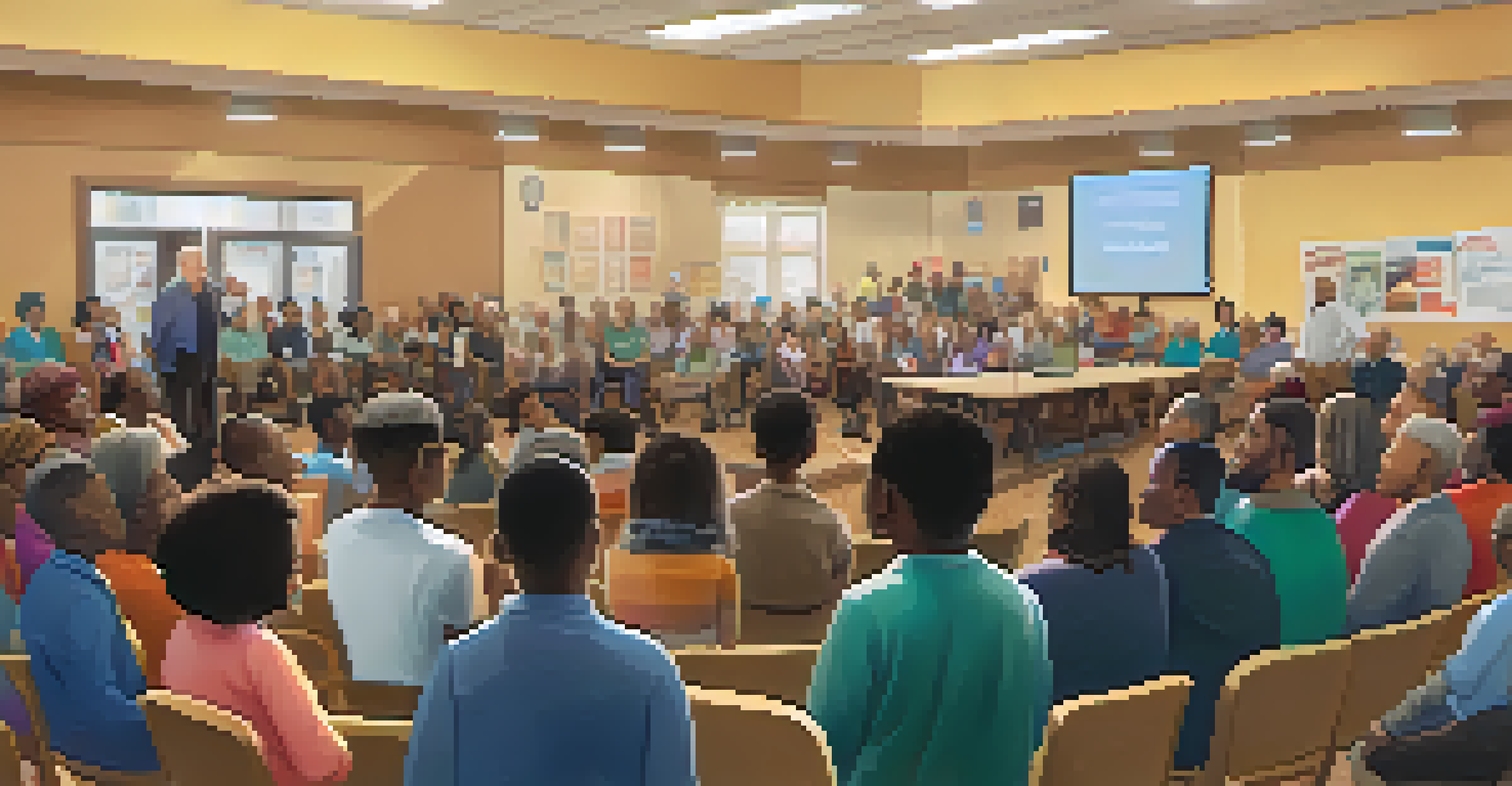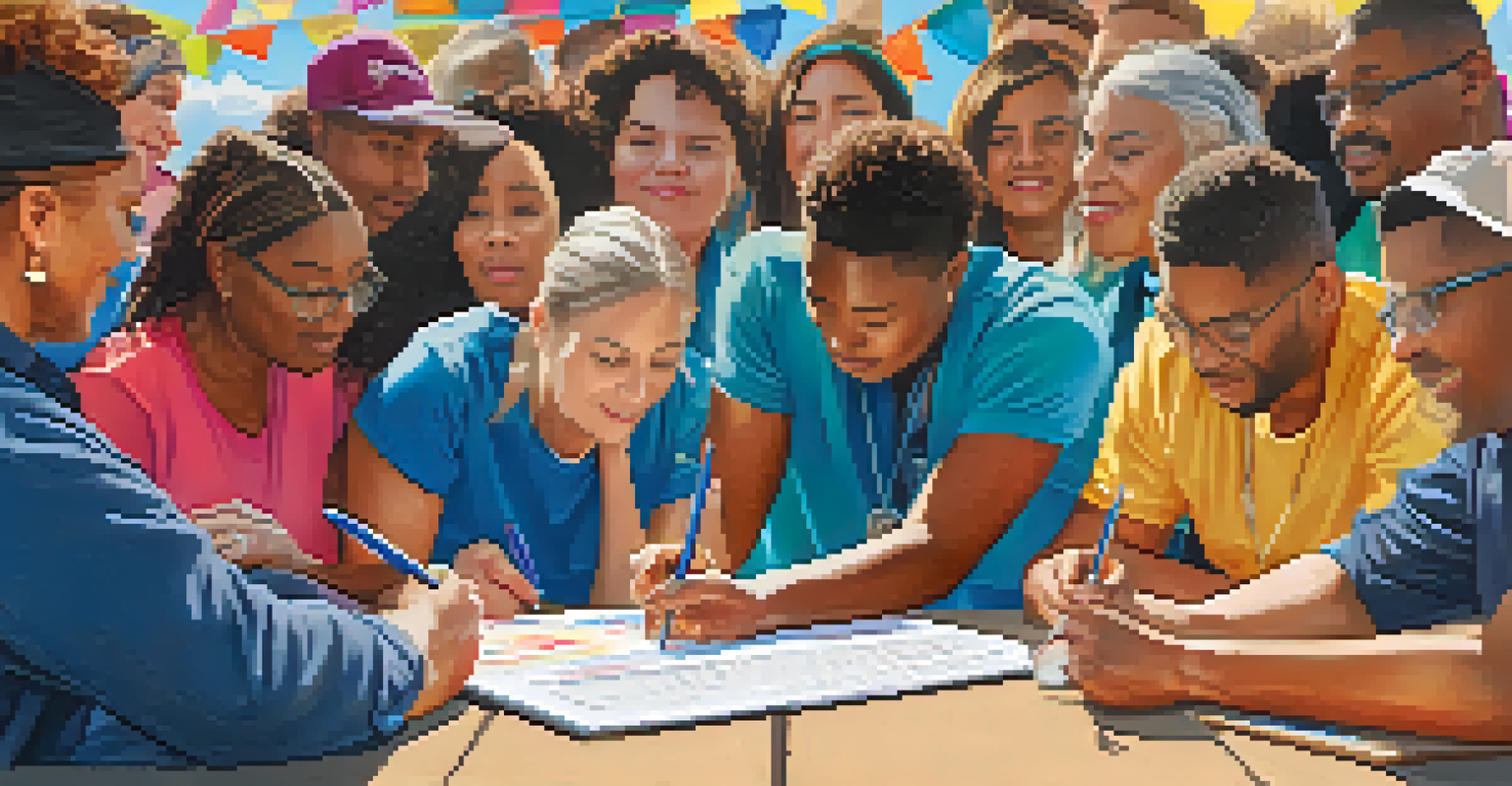How to Participate in Local Governance: Step-by-Step Guide

Understanding Local Governance and Its Importance
Local governance refers to the way communities manage themselves through elected representatives and local authorities. Engaging in this process is crucial because it directly impacts your daily life, from the roads you drive on to the schools your children attend. By understanding how local governance works, you empower yourself to make informed decisions that can influence community outcomes.
The best way to find yourself is to lose yourself in the service of others.
Participating in local governance helps you voice your opinions on issues that matter to you and your neighbors. Whether it’s advocating for better public services or addressing community concerns, your involvement can lead to meaningful changes. Think of local governance as a community garden—when everyone contributes, the garden flourishes and benefits all.
Ultimately, local governance is about creating a sense of belonging and ownership within your community. When you engage, you not only help shape policies but also inspire others to join in. This collective action can lead to a healthier, more vibrant community.
Researching Your Local Government Structure
Before diving into participation, it’s essential to know how your local government is structured. This typically includes understanding the roles of city councils, mayors, and other local officials. Resources like your city’s website or local library can provide valuable information about the governing bodies in your area.

Familiarizing yourself with the local governance structure helps you identify where you can make the most impact. For example, if you have a passion for education, knowing who oversees the school board will guide your efforts in advocating for educational reforms. Think of it as mapping out a treasure hunt; the clearer your map, the easier it is to find the hidden gems.
Engage for Community Impact
Participating in local governance empowers you to influence decisions that shape your community.
Don’t hesitate to reach out to local advocacy groups or civic organizations for guidance. They often have resources and insights that can help you navigate the complexities of local governance. Engaging with these groups can also inspire you to take action on issues that resonate with you.
Identifying Key Issues in Your Community
Every community has its unique challenges and opportunities, so identifying key issues is a critical first step. Take some time to reflect on what matters most to you—be it housing, public safety, or environmental concerns. Engaging with your neighbors can provide additional perspectives and highlight issues you may not have considered.
Democracy is not a spectator sport.
You can also attend community meetings or forums to hear from local leaders and residents about pressing issues. These gatherings are often a goldmine of information and can help pinpoint what needs attention. It's like tuning into a community radio station; the more you listen, the clearer the conversation becomes.
Once you've identified key issues, prioritize them based on urgency and your capacity to contribute. This will help you focus your efforts effectively and make a tangible impact. Remember, every small action counts towards fostering positive change in your community.
Engaging with Local Officials and Representatives
One of the most impactful ways to participate in local governance is to engage directly with your elected officials. Start by attending town hall meetings or scheduling one-on-one meetings with local representatives. This not only gives you a platform to voice your concerns but also helps build relationships with those who can influence change.
When engaging with officials, come prepared with specific issues and potential solutions. This shows that you’ve done your homework and are genuinely interested in collaborative problem-solving. Think of it like presenting a project at work; the more organized and focused you are, the more likely you are to gain their support.
Know Your Local Officials
Understanding your local government structure helps you identify where to focus your advocacy efforts.
Don’t underestimate the power of follow-ups. After your initial meeting, send a thank-you note and keep the lines of communication open. This shows your commitment to the issues discussed and reinforces your role as an engaged community member.
Participating in Community Meetings and Events
Community meetings and events are excellent opportunities for civic engagement. These gatherings allow residents to discuss local issues, share ideas, and collaborate on solutions. Participating in these events is like joining a book club; you not only learn from others but also contribute your own insights.
Find out when and where these meetings occur in your community, and make it a point to attend regularly. You can often find information on local government websites or community bulletin boards. Being a consistent presence helps you stay informed and builds rapport with other attendees.
Consider volunteering to help organize events or facilitate discussions. This not only enhances your visibility in the community but also allows you to shape the agenda to focus on issues you care about. Your enthusiasm can inspire others to get involved as well.
Advocating for Change Through Petitions and Campaigns
If you’re passionate about a specific issue, consider starting or joining a petition or campaign. This is a powerful way to rally support and demonstrate to local officials that there’s a significant community interest in the issue. Think of petitions as collective voices; the more signatures you gather, the louder the call for action.
You can create petitions online or gather signatures in person—both approaches can be effective. Mobilizing your friends, family, and neighbors can amplify your efforts. Social media is also a useful tool for spreading the word and gathering support; it’s like using a megaphone to reach a wider audience.
Join Forces for Change
Joining local advocacy groups enhances your impact by providing resources and a network for collective action.
Once you have a substantial number of signatures, present the petition to local officials or relevant boards. This step not only shows your commitment but also places the issue on their radar. Remember, persistence is key; even if you don’t see immediate results, your efforts can pave the way for future change.
Joining Local Advocacy Groups and Organizations
Joining local advocacy groups can significantly enhance your impact on local governance. These organizations often have established networks, resources, and expertise that can help amplify your voice. It’s like being part of a sports team; together, you can achieve goals that would be challenging to tackle alone.
Look for groups that align with your interests or the issues you care about. Whether it’s environmental protection, social justice, or education reform, there’s likely a group working towards those goals. Engaging with these organizations can also provide valuable training and resources to enhance your advocacy skills.

Don’t hesitate to take on leadership roles within these groups, as this can further bolster your influence in local governance. Your involvement not only helps the group achieve its mission but also fosters a sense of community and belonging.
Staying Informed and Continuously Engaging
Participating in local governance is not a one-time event; it requires ongoing engagement and education. Stay informed about local issues, policies, and the actions of your elected officials. Subscribing to local newsletters, following government websites, and engaging with community media can help you remain up-to-date.
Consider attending workshops or training sessions that focus on civic engagement and advocacy. These opportunities often provide valuable insights into how local governance functions and how you can make a difference. It’s similar to attending a class; the more you learn, the better equipped you are to contribute.
Finally, encourage others to get involved as well. Share what you’ve learned and inspire your friends and family to engage in local governance. The more people participate, the stronger and more resilient your community becomes.